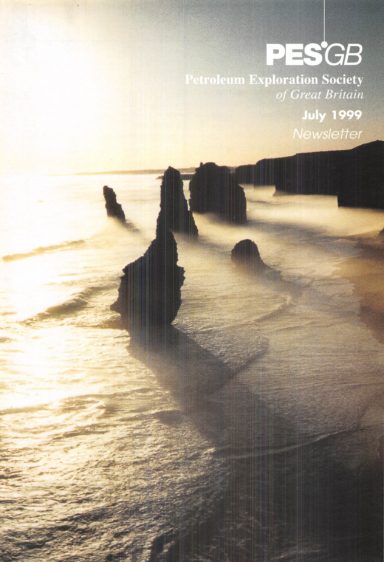PESGB July 1999
Who will drink the next barrel?
So, who said ” I’ ll drink every barrel of oil discovered in the North Sea?”
We have an answer, which I’ll address later. Several of you wrote in with your version of history – thank you. The variation was intriguing, but the general theme was consistent.
In March the discussion was about the pitfalls of expert future predictions, and being positive about new potential which is currently unknown. From the question above, agreeing on history seems to be almost as difficult! Asking for your ideas on what the UK oil and gas industry will look like 10 or 20 years from now has been barren: no one has yet come forward with a picture.
What could the shape of our business be like in 10 years? Let’s take a look at a few trends that are occurring today, and develop some ideas on where they may lead.
A possible future environment
With the decrease in oil price by 50% in 1997-99, international oil companies have significantly cut exploration expenditure. Production and reserves growth targets have been exchanged for defence of net income. Goldman Sachs estimates that with global production at about 75mm barrels per day, a change of 2.25mm barrels per day can nearly halve or double the price. Goldman’s
study, as reported recently in the press (and see the THS news article on page 54), states that non-OPEC supply will continue to decline and projects an OPEC controlled price of $30 by 2010. Price-forecasters were fired years ago, but the trend of global production and reserves change looks established.
Mergers increase production and reserves for the resultant company, but do not change the resource base as a whole. The soon-to-be three supermajors made pro forma post-tax earnings of $19bn in 1998, comfortably exceeding the $ 16bn gross domestic product of Luxembourg. Forecasts from BT Alex Brown suggest that within two years all three will have profits of $10bn or more. This may draw unwelcome attention from politicians. Is biggest best? Is clout going to win over nimbleness?
Large companies go through painful change from time to time, and some manage better than others do. It won’t be long before change is again required but now the supertanker is bigger with a turning circle larger than the Arabian Gulf. It will be difficult for them to dance.
Small, well-run companies ought to thrive. The large internationals may find that their radar screens high light few large opportunities, whereas small, focused niche players find multitudes of prospects. If the oil price does firm substantially, strongest investment returns will likely come from the smaller companies.
Admired companies today are not necessarily those of tomorrow. History shows that there is a revolving door where companies and business leaders tum rapidly from champ to chump. Watch out stars of today, and who of those merely average or struggling will be the major forces of tomorrow?
Possible change and consequences in exploration
For we explorers, what changes in working may occur in the next 10 years? Here are some personal ideas.
• Some large companies still retain research departments. Those that don ‘t realised that company owned research departments do not add value, that costly new techniques provide little competitive advantage that adds to the bottom line. Maybe in 10 years independent establishments and focused university departments that are supported by joint industry funding will handle all significant research
• Data confidentiality is limited to one year in the UK to spur progress
• Exploration consultancy groups become important. They are able to identify the prospects more efficiently than the exploration companies of the past. Some sell prospects to companies, others form alliances and drill themselves. They sponsor new speculative seismic data acquisition. There is a migration away from company exploration departments to the consultancies.
Thought provoking, or not bold enough? What should you be doing now to ensure your continuing contribution in the future?
The last barrel…
Finally, back to the barrel that was drunk. George Williams e.B.E. (former Managing Director at Shell Expro from 1964 to 1973, and former Director General of UKOOA from 1975 to 1984) gave a presentation in ’64 or ’65 that was optimistic about finding oil in the Northern North Sea. Likely prompted by BP vs Shell competitiveness, Tom Gaskell of BP got up from the audience and made the statement. During drinks, George bet Tom a lunch as soon as oil was discovered and George duly enjoyed his lunch at Tom’s expense at the ” In and Out Club.”
Thank you, George, for putting history straight.


